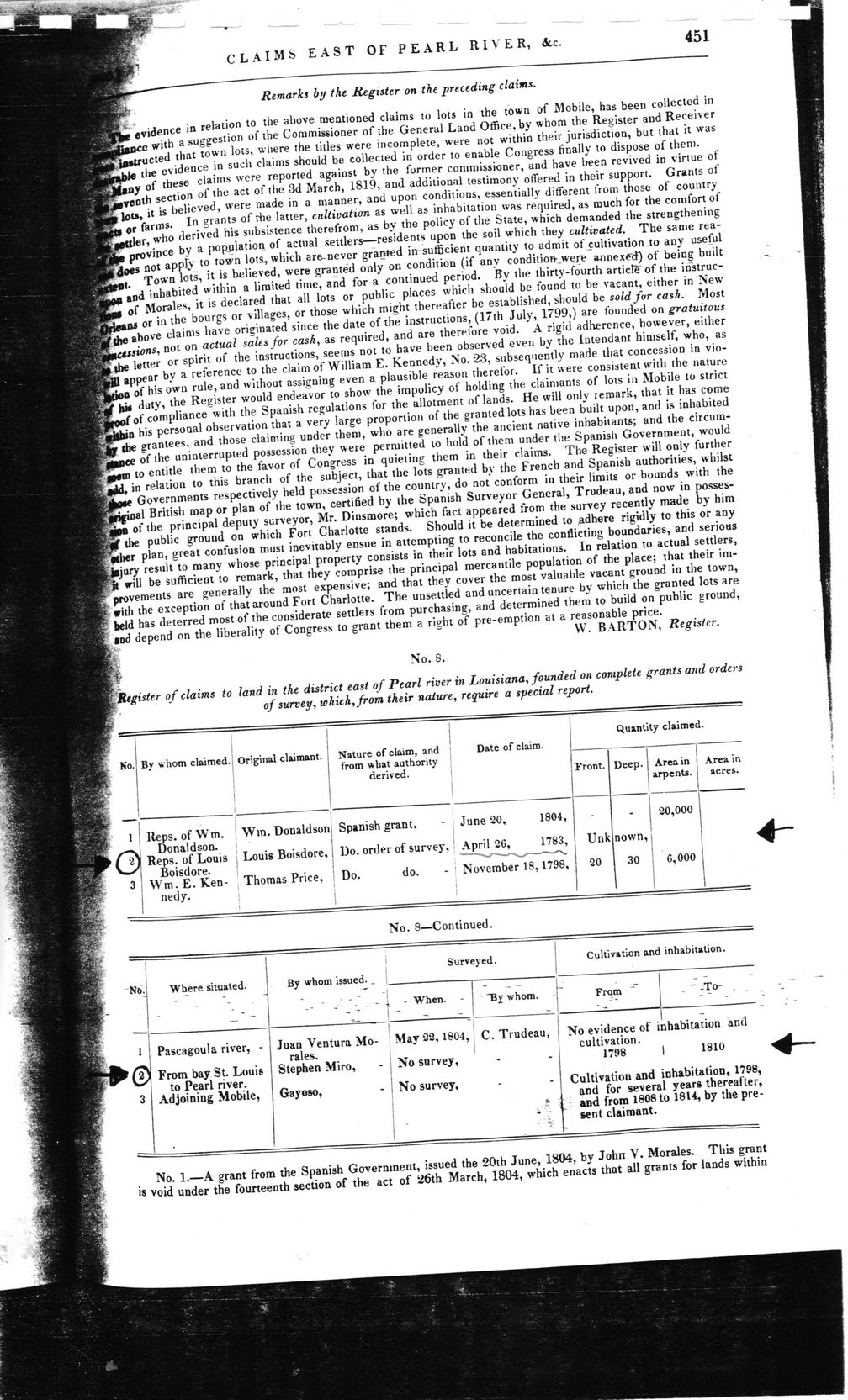This text was obtained via automated optical character recognition.
It has not been edited and may therefore contain several errors.
CLAIMS EAST OF PEARL RIVER, <kc. 451 Remarks by the Register on the preceding claims. Evidence in relation to the above mentioned claims to lots in the town of Mobile, has been coliectcd in e with a suggestion of the Commissioner of the General Land Office, by whom the Register and Receiver xucted that town lots, where the titles were incomplete, were not within their jurisdiction, but that it was the evidence in such claims should be collected in order to enable Congress finally to dispose of then). .«/ of these claims were reported against by the former commissioner, and have been revived in virtue of -eoth section ol the act of the 3d March, 1819, and additional testimony offered in their support. Grants of lot*, it's believed, were made in a manner, and upon conditions, essentially different from those of country or farms. In grants of the latter, cultivation as well as inhabitation was required, as much for the comfort of *er, who derived his subsistence therefrom, as by the policy of the State, which demanded the strengthening province by a population of actual settlers—residents upon the soil which they cultivated. The same rea-i not apply to town lots, which are-never granted in sufficient quantity to admit of cultivation.to any useful -I. Town loti, it is believed, were granted only on condition (if any condition-_were luinexfd) of being built “tnd inhabited within a limited time, and for a continued period. By the thirty-fourth article of the iristruc-of Morales, it is declared that all lots or public places which should be found to be vacant, either in New ■iu or in the bourgs or villages, or those which might thereafter be established, should be sold for cash. Most ie above claims have originated since the date of the instructions, (17th July, 1799,) are founded on gratuitous ssions, not on actual sales for cash, as required, and are therefore void. A rigid adherence, however, either je letter or spirit of the instructions, seems not to have been observed even by the Intendant himself, who, as "appear by a reference to the claim of William E. Kennedy, No. 23, subsequently made that concession in vio-of his own rule, and without assigning even a plausible reason therefor. If it were consistent with the nature dutv, the Register would endeavor to show the impolicy of holding the claimants of lots in Mobile to strict r of compliance with the Spanish regulations for the allotment of lands. He will only remark, that it has come kSn his personal observation that a very large proportion of the granted lots has been built upon, and is inhabited the grantees, and those claiming under them, who are generally the ancient native inhabitants; and the circum-jjpgee of the uninterrupted possession they were permitted to hold of them under the Spanish Government, would a to entitle them to the favor of Congress in quieting them in their claims. The Register will only further in relation to this branch of the subject, that the lots granted by the French and Spanish authorities, whilst Governments respectively held possession of the country, do not conform in their limits or bounds with the ;inal British map or plan of the town, certified by the Spanish Surveyor General, Trudeau, and now in posses-of the principal deputy surveyor, Mr. Dinsmore; which fart appeared from the survey recently made by him the public ground on which Fort Charlotte stands. Should it be determined to adhere rigidly to this or any Jtlier plan, great confusion must inevitably ensue in attempting to reconcile the conflicting boundaries, and serious jury result to many whose principal property consists in their lots and habitations. In relation to actual settlers, „ will be sufficient to remark, that they comprise the principal mercantile population of the place; that their im-provements are generally the most expensive; and that they cover the most valuable vacant ground in the town, 'with the exception of that around Fort Charlotte. The unsettled and uncertain tenure by which the granted lots are beld has deterred most of the considerate settlers from purchasing, and determined them to build on public ground, *od depend on the liberality of Congress to grant them a right of pre-emption at a reasonable price. VV. BARTON, Register. % No. 8. ffUgister of claims to land in the district east of Pearl river in Louisiana, founded on complete grants and orders of survey, which, from their nature, require a special report. No. By whom claimed. Original claimant. Nature of claim, and from what authority derived. Date of claim. Quantity claimed. Front. Deep. Area in arpents. Area in acres. Reps, of W m. Donaldson. Reps, of Louis Boisdore. Wm. E. Kennedy. Wm. Donaldson Louis Boisdore, Thomas Price, Spanish grant, - June 20, Do. order of survey, ; April 26, ! November 18, 1798, 1801, 1783, Do do. Unk 20 20,000 nown, | 30 ! 6,000 4- No. 8—Continued. No. Where situated. Pascagoula river, - From bay St. Louis to Pearl river. Adjoining Mobile, By whom issued. _ Surveyed. Cultivation and inhabitation. - When. - liy whom. j From ~ -I®- - - I Juan Ventura Mo- May 22, 1804,! C. Trudeau, rales. No survey, Stephen Miro, Gayoso, No survey. No evidence of inhabitation and cultivation. 1798 I 1810 Cultivation and inhabitation, 1798, and for several year9 thereafter, and from 1808 to 1814, by the present claimant. No. 1.—A grant from the Spanish Government, issued the 20th June, 1804, by John V. Morales. This grant is void under the fourteenth section of the act of 26th March, 1804, which enacts that all grants for lands within

Hancock County Early American-State-Papers-Documents-Book-(064)